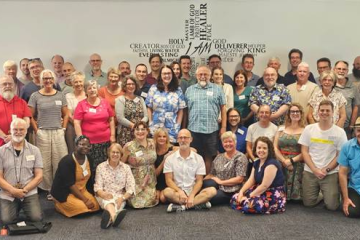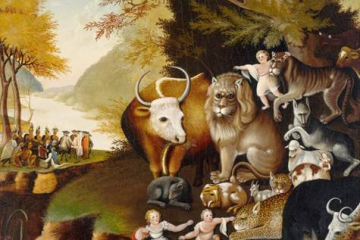We are the magi – Isaiah 60:1-6 and Matthew 2:1-12
Courtesy of quarantine, it was a very quiet Christmas at my house. As far as I know there were no nativity scenes in our back shed. Or shepherds popping in. Or choruses of angels. But there were people bringing – and leaving at a safe distance – gifts. Some wise people brought chocolate and other delicious treats. One wise man (thank you, John!) brought emergency milk and bananas (and more chocolate!) and two wise women brought yet more treats and – pure gold – a jigsaw puzzle!
Thank you very much to all of you!
It reminded me again of how little we know about the wise men in today’s reading. We assume there were three of them because three gifts were mentioned, gold, frankincense, and myrrh, but the text doesn’t actually say. We sometimes call them kings, because our reading from Isaiah and Psalm 72 both speak of kings bringing tribute to Israel, but the text refers to them as ‘magi’. Magi is Greek for magicians, astrologers or interpreters of dreams, and contemporary scholars say they were most likely followers of Zoroastrianism. One commentary I read said it is possible there were wise women too, as Zoroastrian groups included women practitioners.
What we do know about them, and this is the most significant point, is that they were foreigners. They were not Jews.
Here, in Matthew, and this is worth noting because Matthew is the gospel most written for a Jewish audience, the first people to acknowledge the birth of Jesus are not faithful Jews awaiting the Messiah, but complete foreigners. There is a challenge here for Matthew’s audience, and there is a stinging rebuke of the residents of Jerusalem, who rather than responding with joy to the news of a new king, share Herod’s fear, and of the chief priests and scribes who know the scriptures, back to front, but lack the desire, the openness and readiness of the magi, to follow them to their joyful conclusion.
It is foreigners, in Matthew, who are the first to worship the newborn king, just as earlier in Matthew, the genealogy of Jesus breaks from the traditional pattern by naming women, several of whom had dubious reputations, and several of whom were also foreigners. All these references anticipate the conclusion of Matthew, the expansion of the mission of Jesus to the Gentiles and are variations on a theme running through the Old Testament of the nations streaming to the mountain of the Lord, of all peoples together sharing in the great gospel feast. The story of the magi is, as Old Testament scholar William Loader puts it, “a celebration of inclusiveness”.
We know something else about them too. They faced real danger in their search for the Christ child.
This is foreshadowed in verse one where we are told that this is, ‘in the time of King Herod’. This is Herod the Great, the father of Herod Antipas who reigned during Jesus’s ministry, but both Herods were known for their cruelty, cunning and desperate desire to remain in power. This Herod murdered a wife, three sons, a mother-in-law, a brother-in-law, an uncle, and many others. Here, in this passage, his cunning is revealed. It is Herod – not the chief priests and scribes – who links the magi’s news with the ancient prophecies of the Messiah. Herod who secretly calls for them to know the exact time the star appeared. While professing a desire to worship the child he is internally drafting orders for his death squads. But what the writer of Matthew sees is that beneath all these machinations Herod is frightened, as are all Herods who maintain their power through violence and oppression.
But the danger is real. This is the time of King Herod. The magi are warned in a dream, Joseph, Mary, and the child flee into Egypt, but terrible events unfold in Bethlehem. Jesus’ escape and his return from Egypt fulfil the Scriptural promise that he is a new Moses for his people Israel, but another Herod eventually catches up with him and kills him. The title, the king of Jews, that the magi use here is used only once again in Matthew, when these words are nailed to Jesus’ cross.
But this is a new king, who rules a different way, who will shepherd his people, who dies a different way, identifying with the lost and least, and who lives again a new way, calling his followers to take a different road. All these truths come together in this moment of overwhelming joy when the magi reach the place where the child was, where they fall on their knees and worship, and offer their gifts.
There is one other thing we know about the magi and that is – that they are us! Here in the gospel of Matthew the magi do not simply represent foreigners; they represent us!
Over the centuries they have been identified as coming from Arabia or Persia or India or Africa. Many Chinese Christians believe that they came from China! And we are celebrating this today by singing songs about the magi from North America and Europe, from South America and even from Australia! Because the magi represent all of us who, according to Ephesians chapter 2, ‘were once aliens and strangers to the covenants of promise, who were once without hope and without God, who were once far off and have been brought near by the blood of Christ.’
But we still live in the time of Herod. The desire for power and greed for more still cause terrible events around our world. We are still alienated from each other, as Brueggemann says, by fear, anxiety, brutality, violence, and loss. But our God has shone light on us, and we are invited to worship a king who rules as a shepherd, who identifies with the lost and the least, who calls his followers to take another road.
I read this week this story of the small piece of parchment that was found sown into the coat of seventeenth century French scientist Blaise Pascal when he died in 1662. At the top of the paper Pascal had drawn a cross and underneath were these words.
In the year of the Lord 1654
Monday, November 23
From about half-past ten in the evening until half-past twelve.
Fire
God of Abraham, God of Isaac, God of Jacob
Not of philosophers nor of the scholars.
Certitude. Certitude. Feeling. Joy, Peace.
God of Jesus Christ,
My God and thy God.
“Thy God shall be my God.”
Forgetfulness of the world and of everything, except God.
He is to be found only by the ways taught in the Gospel.
Greatness of the soul of man.
“Righteous Father, the world hath not know thee,
but I have know thee.”
Joy, joy, joy, tears of joy.
It goes on, but it describes the overwhelming joy that this wise man experienced in an intense two-hour religious experience that he had kept secret until his death, for eight years storing this record of it in the lining of his coat, taking care to sew and unsew it every time he changed his coat. It was an experience of God that changed him and the course of his life.
How do we respond? We too, as the hymn that Grace sang earlier, are invited to offer ourselves. We too are invited to take the difficult journeys in this time of King Herod through life and death to find life again. We too are invited to know this overwhelming joy of worshipping our shepherd king, our king of the Jews and of all people, our risen Saviour.
We do not have a practice of kneeling in worship, but if it is comfortable for you to do so (1.5 metre rule) can I invite you to kneel now as I pray.
Let us kneel in the darkness,
Until we see God’s light emerge.
Let us wait with hope filled hearts,
As Christ’s image grows within us and shows us life.
Let Christ speak to us and teach us love,
Until we open our hearts to be his home.
~ written by Christine Sine (2012) and posted on GodSpace.


